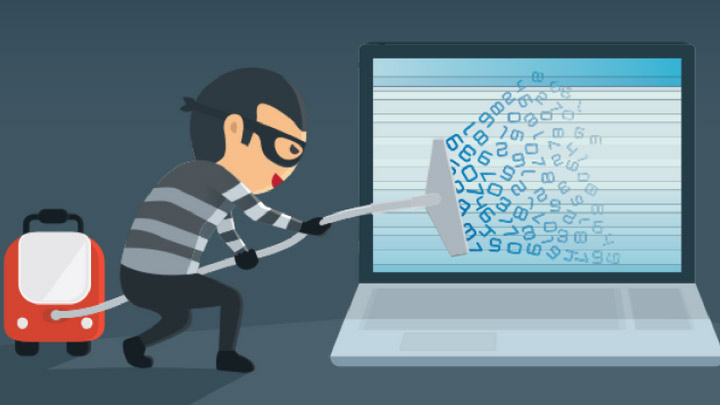Cyber Crime in India has been rapidly evolving since the dawn of the technological era. Every day, in fact, you get to hear different tricks, scams and many other offences being committed on the cyberspace. There are many types of cyber crime in India that have already been listed under the Information Technology Act, 2000, suggesting various types of crimes. Also in order to follow the guidelines of cyber crime act in India, in major cities, many cyber crime cells in India have been set up.
With the advancement of technology, recent cases of cyber crime in India has also increased. Today, many crimes like kidnapping, fraud, hacking, data theft are being committed with the help of internet. Criminals who perform such activities are often referred to as “hackers”. Many of the cyber crime cases in India are registered under the IT Act.
Digitalization is unbridled these days and the Internet has made life easier for everybody, with everything just a click away. From white collar crimes to attacks by terrorist organizations, the number of cyber crimes in India has also increased. It has made man dependent on the technology for every little basic need. Today each need is covered online like online shopping, ordering food, online gaming, making payments and etc.
What is Cyber Crime in India?
In India, cyber crime can be defined as a crime or an unlawful act where the computer is used either as a tool, a target or both. In other terms, cyber crimes in India can be defined as an unauthorized access to some computer system without the permission of rightful owner or place of criminal activity and include everything from online cracking to denial of service attacks.
Some examples of cyber crime include phishing, spoofing, DoS (Denial of Service) attack, credit card fraud, online transaction fraud, cyber defamation, child pornography, etc.
Causes of Cyber Crime in India
Cybercriminals always choose an easy way to make big money. They target rich people or rich organizations like banks, casinos and financial firms where the transaction of a huge amount of money is made on an everyday basis and hack sensitive information.
Catching such criminals is difficult. Hence, that increases the number of cyber-crimes. Computers are vulnerable, so laws are required to protect and safeguard them against cyber criminals. Following are the reasons for the vulnerability of computers:
-
Easy to access – The problem behind safeguarding a computer system from unauthorized access is that there are many possibilities of breach due to the complex technology. Hackers can steal access codes, retina images, advanced voice recorders etc. that can easily fool biometric systems and bypass firewalls can be utilized to get past many security systems.
-
Capacity to store data in comparatively small space – The computer has the unique characteristic of storing data in a very small space. This makes it a lot easier for people to steal data from any other storage device and use it for their own profit.
-
Complex – The computers run on operating systems and these operating systems are programmed of millions of codes. The human mind is imperfect, so they can do mistakes at any stage. The cyber criminals take advantage of these gaps.
-
Negligence – Negligence is one of the characteristics of human conduct. So, there may be a possibility that protecting the computer system we may make any negligence which provides a cyber-criminal the access and control over the computer system.
-
Loss of Evidence – The data related to the crime can be easily destroyed. So, Loss of evidence has become a very common & obvious problem which paralyzes the system behind the investigation of cyber-crimes.
![cyber crimes in India]()
Types of Cyber Crime in India
Cyber crime can be committed in two ways - one in which the computer is the target of a cyber attack, and the other in which the computer is used to commit a cyber crime against any person or entity.
Cyber crimes in India are categorised into main four types which include:
-
Cyber stalking: Generally, the term ‘stalking’ means, repeated acts of harassing someone. Whereas, Cyber stalking is online harassment when a person is stalked using the internet as a medium. Generally, the stalker is aware of the victim or gains knowledge about victim’s family and their activities, instead of stalking them in reality, the stalker keeps a track of a person’s online activities to stalk the victim. A Stalker can use the internet, emails, SMS, webcams, phones calls, websites or even videos to harass his target.
-
Hacking: Hacking means getting unauthorised access to someone’s personal information stored in a computer system without the permission of either rightful owner of the computer or person in charge of that particular system for illegal gains or misuse. Every act committed to breaking into a computer system and /or network is hacking. Hackers get access to the user’s personal and sensitive information. They can also monitor every online activity of a person like logging in, credentials added, banking transactions made, etc.
-
Cracking: Crack generally refers to the means of achieving software cracking. Cracking refers to digitally removing the Copyright protection code which prevents copied or pirated software from working on computers which do not have the Software vendor or owner’s authorisation. The person who is involved in such activity is different from a hacker and is known as a cracker. Cracker uses his knowledge to break the cyber law and tampers with the computer.
-
Defamation: Online or cyber defamation involves damaging someone’s reputation in society using a computer or the internet as a medium. This is done by writing a derogatory statement about a person on social media, posting vulgar pictures or videos, sending derogatory E-mail to the victim’s friends, etc.
-
Online Fraud: Online fraud is one of the most common types of cyber crime. It involves stealing a person’s sensitive information like banking credentials by using phishing sites and withdrawing money from the victim’s account. Online lottery scams are also rampant these days, one such example is the Nigeria lottery scams.
-
Dissemination of Obscene Material: It includes the distribution of obscene materials or pornography on social media. It includes hosting of websites containing pornographic material which has a tendency to deprave or corrupt the minds of individuals.
-
Child pornography: Circulation of any material that has a tendency to deprave the mind of the minor children is also a cyber crime. It involves the use of electronic devices to create, distribute or access material which is obscene in nature and have a tendency to corrupt young minds.
-
Spoofing: Spoofing involves misrepresentation of the origin of any data. While an Email/SMS is generated from one source, it shows that it has been generated from another. Cyber criminals use this means to get personal information of the user like bank details, etc.
-
Phishing: It involves sending spam emails to the user while claiming to be an established enterprise in order to obtain his personal information.
-
Cyber Crime against property: Cyber crime against property is committed using an electronic device as a medium. Here, the property does not mean any immovable property but includes movable and intangible property like computers, Intellectual Property, etc. Different cyber crimes against property are:
-
Transmitting virus: A computer virus is a malware programme that infects files, disk drives, and computer programmes. Programmes that multiply like viruses and spread from computer to computer are called ‘worms’. Virus, Worms, Trojan Horse, Timebomb, Logic Bomb, Rabbit, and Bacterium are some examples of malicious software that infect the computer.
-
Cybersquatting: Cybersquatting is when two or more persons claim the same domain name. Squatting is unlawfully occupying an uninhabited place. The hacker claims that he was the first one to use the domain name before the actual owner of the domain name.
-
Cyber Vandalism: It involves the destruction of data on any electronic medium during the period when the network service is not available.
-
Intellectual Property Crimes: IPRs are intangible property rights. IPR thefts are the most common cyber crimes in India and include online piracy, software piracy, infringement of patents, designs, trademark, copyright, theft of source code, etc.
-
Cyber crime against Government: The government of a country may become the target of a cyber crime as well. Any cyber crime committed against a government is committed to threatening the unity, honour, and security of the target country. Cyber crime against government includes:
-
Cyber Warfare: Cyber warfare is an Internet-based war conflict wherein the cyber crime is politically motivated. It can disable official websites and networks, disrupt essential services such as Internet connection, steal classified data such as Sensex details and break down sensitive data like the payment gateway.
-
Cyber Terrorism: It is an act of creating fear in the mind of people by using the internet as a medium. Section 66-F of the Information Technology Act, 2002 deals with Cyber Terrorism.
-
Online Gambling: Gambling is prohibited in India under the Public Gambling Act, 1867. Online gambling is illegal all over India, except in Sikkim.
-
Cyber Trafficking: Trafficking involves dealing with illegal trade activities such as human trafficking, slaves.
![cyber crime in India]()
How to Prevent Cyber Crime?
To deal with the situation of cyber crime effectively, one needs to establish multi-dimensional public-private collaborations between law enforcement agencies, the information technology industry, information security organizations, internet companies, and financial institutions.
Unlike the real world, cyber criminals do not fight one another for supremacy or control. Instead, they work together to improve their skills and even help out each other with new opportunities. Hence, the usual methods of fighting crime cannot be used against cyber crimes in India.
-
Use Strong Passwords: Use the different password and username combinations for different accounts and resist the temptation to write them down.
-
Keep Your social media accounts private: Be sure that you keep your social networking profiles (Facebook, Twitter, YouTube, etc.) private. Be sure to check your security settings. Be careful of what information you post online. Once it is on the Internet it is there forever.
-
Secure your Mobile Devices: Many people are not aware that their mobile devices are also vulnerable to malicious software, such as computer viruses and hackers. Be sure to download applications only from trusted sources. It is also crucial that you keep your operating system up-to-date. Be sure to install anti-virus software and to use a secure lock screen as well. Otherwise, anyone can access all your personal information on your phone if you misplace it or even set it down for a few moments. Someone could even install malicious software that could track your every movement through your GPS.
-
Protect your data: Protect your data by using encryption for your most sensitive files such financial records and tax returns.
-
Protect your identity online: When it comes to protecting your identity online it is better to be too cautious than not cautious enough. It is critical that you be cautious when giving out personal ID such as your name, address, phone number and/or financial information on the Internet. Be certain to make sure websites are secure when making online purchases, etc. This includes enabling your privacy settings when using/accessing social networking sites.
-
Keep your computer current with the latest patches and updates: One of the best ways to keep attackers away from your computer is to apply patches and other software fixes when they become available. By regularly updating your computer, you block attackers from being able to take advantage of software flaws (vulnerabilities) that they could otherwise use to break into your system.
-
Protect your computer with security software: Several types of security software are necessary for basic online security. Security software essentials include firewall and antivirus programs. A firewall is usually your computer’s first line of defense. It controls who and what can communicate with your computer online. You could think of a firewall as a sort of “policeman” that watches all the data attempting to flow in and out of your computer on the Internet, allowing communications that it knows are safe and blocking “bad” traffic such as attacks from ever reaching your computer.
![How to prevent cyber crime]()
Cyber Crime and Cyber Laws
In order to curb the menace caused by the cybercriminals, the government has enacted the Information Technology Act, 2000 whose prime objective is to create an enabling environment for effective use of the internet along with reporting the cyber crime in India.
The IT Act is a comprehensive law that deals with technology with respect to e-governance, e-commerce, and e-banking. The cyber law also lays down penalties and cyber crime punishment in India.
The Indian Penal Code was also amended to include crimes like fraud, forgery, theft, etc. committed over the internet or through an electronic medium.
How to report Cyber Crime in India?
To report cyber crime in India, the first step is to file a complaint at the cyber crime cell in a police station of the city where the crime has taken place, or where the device is located which was affected.
The next step would be knowing where to report cyber crime in India, which can be done online and offline by registering your complaint against the committed cyber crime. India has two sources that mainly attend to your complaint i.e. cyber cell or a police station.
You can go to the police station of your state or send an mail to the Police as they will forward your complaint to the Cyber Cell or you can directly mail the complaint to cyber cell.
In order to know better about how to report cyber crime India, the first step includes filing a complaint as per cyber crime laws in India. There is no cyber crime complaint online letter format, but there are prerequisites of the following documents that must be provided:
1) In the case of hacking, the following information is required to file a cyber crime complaint:
-
Server logs
-
Copy of defaced web page in soft copy as well as hard copy format, if a website is defaced.
-
If data is compromised on a server or computer, a soft copy of the original data and soft copy of compromised data are required.
-
Access control mechanism details i.e. who had the access and of what kind.
-
List of suspects - if the victim is suspecting on anyone.
2) In case of email abuse, the following steps must be taken to file a cyber crime complaint:
What is the punishment for cyber crime in India?
The punishment for cyber crime in India varies in every case as per the type of cyber crime committed and the gravity of the cyber crime along with the damage caused due to it. It is, therefore, best advised to consult a cyber lawyer in your city to file a complaint and understand the legal formalities and documents required as per the cyber crime law in India.
![how to report cyber crime India]()
Who can help you here?
You can any day get the expert legal advice on cyber crime matters from proficient lawyers and advocates. All you have to do is just send an email at consult@myadvo.in or give a call at +91-9811782573.
MyAdvo acts as a client's legal concierge providing technology solutions for matching the appropriate lawyers to client’s case demands, price discovery and timely case updates. With the use of technological solutions, MyAdvo provides you with an extensive list of lawyers along with giving you access to their information such as expertise, location, etc.
MyAdvo lets you find the right lawyer anywhere in India online, all you have to do is connect and express your legal issues. You can consult the best lawyer online and also ask for legal advice online.





